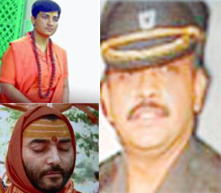
New Delhi, April 30: The National Investigation Agency (NIA), which is probing saffron terror cases, has found evidence that blasts in Purna, Parbhani, Jalna and Nanded between 2003 and 2006 are all connected with the perpetrators of Malegaon blasts, although in a peculiar way. All these blasts, in Marathwada region of central Maharashtra, were carried out by proteges of Sunil Joshi, the mastermind of the Malegaon and Samjhauta Express blasts.
The agency has found that Himanshu Panse, Sanjay Chaudhari and several of their associates, all accused in the series of blasts through 2003-2006 in central Maharashtra, were actually trained by Joshi's group that allegedly executed the Malegaon, Samjhauta Express, Ajmer Sharif and Mecca Masjid blasts.
In fact, it was Joshi's group that had taught Panse how to assemble bombs and arranged for his training in Pune's Singhgadh area and other places including the Bhonsala Military School, sources said.
A senior NIA official said, "There is evidence that Panse and some others from his group used to frequently go to Madhya Pradesh, particularly Dewas, and had some connection with Sunil Joshi. We have learnt that Joshi's group was in fact training them since early 2000 as part of their larger plan to target Muslims across the country. Panse and others were Joshi's foot-soldiers."
Despite this close connection, however, NIA says the Marathwada blasts were not sanctioned by Joshi or Abhinav Bharat. "Joshi's group had trained these men as a sleeper module, who would be used later when the group was fully prepared to execute big attacks. However, the overenthusiastic Panse group started making bombs and attack plans on its own, much to the detriment of Joshi's plans," said the official.
"After the first couple of blasts, they were even reprimanded by the Joshi group for executing what the group called 'chillar blasts'," another official said. Sources said Joshi's group also feared that with their reckless blasts, Panse's group was likely to expose the larger designs of Hindu terror. "And that's exactly what happened in the 2006 Nanded blasts in which the bomb meant to be exploded in Aurangabad went off in the house of one of the accused, killing Panse. Thankfully for Joshi, his group's name did not figure on the radar then."
This development has now brought all Hindu terror cases, except the recent attacks and arrests in Mewat district of Haryana, under one umbrella of the Joshi group. While the Nanded blast has been investigated by the CBI, the other Marathwada blasts have been chargesheeted by Maharashtra ATS.





Comments
Add new comment